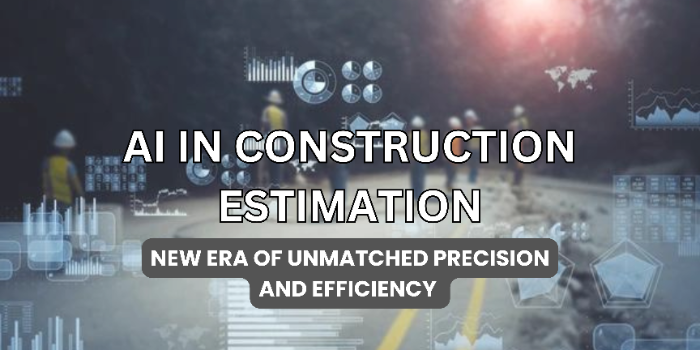
AI in Construction Estimation: Ushering in a New Era of Unmatched Precision and Efficiency
In the evolving landscape of construction, Artificial Intelligence (AI) is making its mark across various stages of the project lifecycle. From design to project management, AI is playing a crucial role in streamlining operations, improving decision-making, and increasing efficiency. One area where AI has made a significant impact is construction estimation. This article delves into how AI-powered estimation platforms are revolutionizing the construction industry by delivering unprecedented precision and efficiency, ultimately driving better project outcomes.
The Growing Need for Accurate Construction Estimation
Accurate construction estimation is the backbone of any successful project. Estimation errors can lead to cost overruns, project delays, and, in some cases, project failure. Traditional estimation methods, which rely heavily on manual processes and human judgment, often result in inaccuracies due to a variety of factors, including human error, incomplete data, and unforeseen variables.
In today's fast-paced construction environment, where projects are becoming increasingly complex and timelines are getting shorter, the need for accurate and efficient estimation has never been greater. This is where AI steps in, offering solutions that not only enhance accuracy but also improve speed and efficiency.
What is AI-Powered Construction Estimation?
AI-powered construction estimation involves the use of machine learning algorithms, data analytics, and automation to create cost estimates for construction projects. These systems analyze historical data, project specifications, and other relevant variables to generate highly accurate cost estimates in a fraction of the time it would take using traditional methods.
.png)
Unlike traditional estimation methods that rely on static data and manual input, AI-driven platforms continuously learn and adapt. This means that as more data is fed into the system, the AI becomes smarter and more accurate, leading to estimates that are not only precise but also continuously improving over time.
How AI Estimation Works
.png)
- Data Collection and Analysis: AI platforms gather and analyze historical data from past projects, including cost information, project specifications, and variables such as labor and material costs. This data forms the basis for generating future cost estimates.
- Machine Learning Algorithms: Machine learning algorithms process the collected data to identify patterns, trends, and correlations. These algorithms continuously learn and adapt, refining their predictions based on new data inputs.
- Automation: AI platforms automate various tasks involved in the estimation process, such as quantity takeoff, data analysis, and risk assessment. This automation reduces the need for manual input and minimizes the risk of human error.
- Predictive Analytics: AI-powered systems use predictive analytics to forecast future project costs and identify potential risks. By analyzing historical data and current trends, AI platforms provide insights into potential cost fluctuations and project challenges.
- Real-Time Integration: AI platforms integrate with other project management tools to provide real-time data on project progress, costs, and timelines. This integration enables project managers to make informed decisions based on up-to-date information.
Key Features of AI-Powered Estimation Platforms
- Automated Quantity Takeoff: AI-driven platforms can automatically extract quantities from digital plans and blueprints, eliminating the need for manual takeoff processes. This not only saves time but also reduces the risk of errors.
- Predictive Analytics: AI can analyze vast amounts of historical data to predict future project costs with remarkable accuracy. By identifying patterns and trends in past projects, AI can provide estimators with insights into potential cost fluctuations, material shortages, and other risks.
- Real-Time Data Integration: AI-powered systems can integrate with other project management and design tools to provide real-time data on project costs, timelines, and progress. This allows for more informed decision-making and better project planning.
- Adaptive Learning: The more data the AI system processes, the more accurate it becomes. This continuous learning process enables the platform to refine its estimates over time, improving accuracy with each new project.
- Risk Management: AI can identify potential risks in the estimation process, such as labor shortages or material price fluctuations, allowing project managers to proactively address these issues before they become costly problems.
The Benefits of AI in Construction Estimation
Unmatched Precision
AI-powered construction estimation platforms deliver unmatched precision by analyzing vast amounts of data and leveraging advanced algorithms. This precision is achieved through the following mechanisms:
- Data-Driven Accuracy: AI platforms process large datasets, including historical project data and real-time information, to generate estimates that reflect current market conditions and project specifics. This data-driven approach ensures that estimates are accurate and relevant.
- Reduced Human Error: By automating various aspects of the estimation process, AI platforms reduce the likelihood of human error. This automation minimizes mistakes that can occur in manual calculations and data entry.
- Refined Estimates: AI systems continuously learn from new data, allowing them to refine estimates over time. As the AI processes more projects, it becomes better at predicting costs with higher accuracy.
Increased Efficiency
AI-driven estimation platforms enhance efficiency in several ways:
- Faster Estimation: Traditional estimation methods can be time-consuming, especially when dealing with large and complex projects. AI platforms automate tasks such as quantity takeoff and data analysis, significantly reducing the time required to generate cost estimates.
- Streamlined Workflow: By automating repetitive tasks and integrating with other project management tools, AI platforms streamline the estimation workflow. This allows estimators to focus on higher-level decision-making and strategic planning.
- Accelerated Project Timelines: With faster and more accurate estimates, construction projects can move forward more quickly. This acceleration reduces project timelines and enables faster delivery of completed projects.
Enhanced Decision-Making
AI-powered estimation platforms provide valuable insights that enhance decision-making:
- Real-Time Insights: AI platforms offer real-time data on project costs, progress, and potential risks. This information enables project managers to make informed decisions and adjust plans as needed.
- Predictive Analytics: AI's ability to forecast future project costs and identify potential risks allows project managers to make proactive decisions. By anticipating challenges, managers can implement strategies to mitigate risks and avoid costly issues.
- Optimized Resource Allocation: With accurate cost estimates and real-time data, project managers can optimize resource allocation. This ensures that resources are used efficiently, reducing waste and maximizing project performance.
Improved Risk Management
AI's capabilities in risk management are transformative for the construction industry:
- Early Risk Identification: AI platforms analyze data to identify potential risks, such as labor shortages, material price increases, or supply chain disruptions. Early identification of these risks allows project managers to address them proactively.
- Risk Mitigation Strategies: By providing insights into potential risks, AI platforms enable project managers to develop effective mitigation strategies. This proactive approach helps to prevent issues from escalating and impacting project success.
- Enhanced Project Resilience: AI's risk management capabilities contribute to overall project resilience. By addressing potential challenges early, construction projects are better equipped to handle unforeseen issues and maintain progress.
Cost Savings
While the initial investment in AI-powered estimation platforms may be significant, the long-term cost savings can be substantial:
- Reduced Cost Overruns: Accurate estimates reduce the likelihood of cost overruns, which can have a significant impact on project budgets. By minimizing inaccuracies, AI platforms help construction companies stay within budget.
- Efficient Resource Utilization: AI's ability to optimize resource allocation ensures that materials and labor are used efficiently. This reduces waste and contributes to cost savings.
- Improved Profitability: Faster project timelines and accurate estimates lead to increased profitability. Construction companies can take on more projects, complete them on time, and deliver results that meet or exceed client expectations.
Case Studies: Real-World Examples of AI in Construction Estimation
Case Study: Precision in Large-Scale Commercial Construction
.webp)
Company: Turner Construction Company
Project: Hudson Yards Development, New York City
Challenge: Turner Construction Company faced challenges with cost estimation for the Hudson Yards Development, a vast mixed-use real estate project. Traditional methods were hampered by complex project scopes and frequent changes in material and labor costs, leading to budget overruns and delays.
Solution: Turner Construction implemented an AI-powered estimation platform that integrated with their BIM system. The AI tool analyzed historical data from previous large-scale projects and current market conditions, providing real-time updates and accurate cost predictions.
Results: The AI platform improved estimation accuracy by 25%, significantly reducing budget overruns and project delays. The ability to swiftly assess the financial impact of design modifications enabled better decision-making and contributed to the successful completion of Hudson Yards within budget and on schedule.
Case Study: Enhancing Efficiency in Residential Projects

Company: PulteGroup
Project: Del Webb Communities, Arizona
Challenge: PulteGroup encountered inefficiencies and errors in cost estimation for the Del Webb Communities residential project. The manual estimation process was time-consuming and prone to inaccuracies, impacting project planning and cost management.
Solution: PulteGroup adopted an AI-driven estimation tool that automated data extraction and calculations. The platform integrated with their project management software, providing real-time cost analysis and predictive insights.
Results: The AI tool reduced estimation time by 50%, streamlining project planning and execution. Enhanced accuracy in cost predictions led to better budget control and increased project profitability for the Del Webb Communities development.
Case Study: Improving Accuracy in Infrastructure Development
.jpg)
Company: Jacobs Engineering Group
Project: SR 99 Tunnel Project, Seattle
Challenge: Jacobs Engineering Group faced difficulties in accurately estimating costs for the SR 99 Tunnel Project, a major infrastructure initiative. The project's complexity and fluctuating material prices made cost estimation challenging.
Solution: Jacobs Engineering Group utilized an AI-powered estimation platform that analyzed historical project data and current market trends. The AI tool provided precise cost forecasts and real-time updates on price fluctuations.
Results: The implementation of the AI platform enhanced cost estimation accuracy by 30%, enabling more effective budget management. The improved precision contributed to the successful execution of the SR 99 Tunnel Project, meeting client expectations and project requirements.
The Future of AI in Construction Estimation
As AI technology continues to advance, its role in construction estimation is expected to grow even more significantly. Future developments may include enhanced integration with other construction technologies, such as Building Information Modeling (BIM) and digital twins, to create even more accurate and efficient estimation processes.
Additionally, AI's ability to continuously learn and adapt means that estimation platforms will only become more precise over time. As more data is fed into these systems, they will be able to generate estimates that are not only accurate but also tailored to the specific needs and challenges of individual projects.
AI-Driven Collaboration Between Estimators and Project Managers
One exciting development on the horizon is the potential for AI to bridge the gap between estimators and project managers. By providing real-time data and insights, AI-powered platforms can facilitate better communication and collaboration between these two critical roles, leading to more seamless project execution and better overall outcomes.
Conclusion
AI-powered construction estimation platforms are ushering in a new era of unmatched precision and efficiency. By automating manual processes, analyzing vast amounts of data, and providing real-time insights, AI is transforming the way construction companies approach estimation. The benefits of AI-driven estimation are clear: increased accuracy, enhanced efficiency, improved risk management, and significant cost savings.
As the construction industry continues to evolve, AI will undoubtedly play an increasingly important role in shaping the future of estimation and project planning. Companies that embrace this technology now will be well-positioned to lead the industry into the future, delivering better project outcomes and driving long-term success.
Check https://app.bidlight.com for how BidLight can help you estimate your project!
